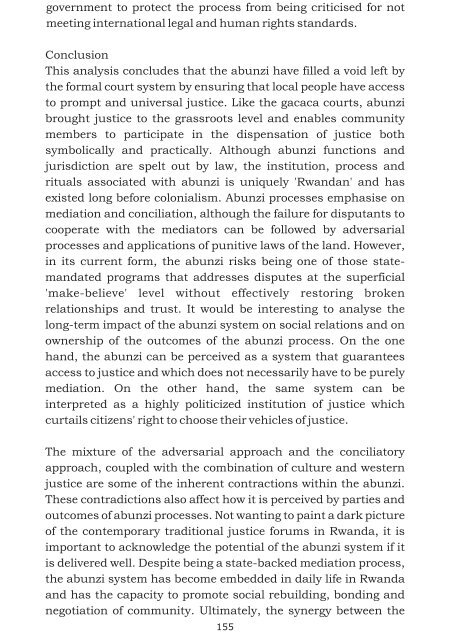Beneficiaries are actors too.pdf - Southern Institute of Peace ...
Beneficiaries are actors too.pdf - Southern Institute of Peace ...
Beneficiaries are actors too.pdf - Southern Institute of Peace ...
You also want an ePaper? Increase the reach of your titles
YUMPU automatically turns print PDFs into web optimized ePapers that Google loves.
government to protect the process from being criticised for not<br />
meeting international legal and human rights standards.<br />
Conclusion<br />
This analysis concludes that the abunzi have filled a void left by<br />
the formal court system by ensuring that local people have access<br />
to prompt and universal justice. Like the gacaca courts, abunzi<br />
brought justice to the grassroots level and enables community<br />
members to participate in the dispensation <strong>of</strong> justice both<br />
symbolically and practically. Although abunzi functions and<br />
jurisdiction <strong>are</strong> spelt out by law, the institution, process and<br />
rituals associated with abunzi is uniquely 'Rwandan' and has<br />
existed long before colonialism. Abunzi processes emphasise on<br />
mediation and conciliation, although the failure for disputants to<br />
cooperate with the mediators can be followed by adversarial<br />
processes and applications <strong>of</strong> punitive laws <strong>of</strong> the land. However,<br />
in its current form, the abunzi risks being one <strong>of</strong> those statemandated<br />
programs that addresses disputes at the superficial<br />
'make-believe' level without effectively restoring broken<br />
relationships and trust. It would be interesting to analyse the<br />
long-term impact <strong>of</strong> the abunzi system on social relations and on<br />
ownership <strong>of</strong> the outcomes <strong>of</strong> the abunzi process. On the one<br />
hand, the abunzi can be perceived as a system that guarantees<br />
access to justice and which does not necessarily have to be purely<br />
mediation. On the other hand, the same system can be<br />
interpreted as a highly politicized institution <strong>of</strong> justice which<br />
curtails citizens' right to choose their vehicles <strong>of</strong> justice.<br />
The mixture <strong>of</strong> the adversarial approach and the conciliatory<br />
approach, coupled with the combination <strong>of</strong> culture and western<br />
justice <strong>are</strong> some <strong>of</strong> the inherent contractions within the abunzi.<br />
These contradictions also affect how it is perceived by parties and<br />
outcomes <strong>of</strong> abunzi processes. Not wanting to paint a dark picture<br />
<strong>of</strong> the contemporary traditional justice forums in Rwanda, it is<br />
important to acknowledge the potential <strong>of</strong> the abunzi system if it<br />
is delivered well. Despite being a state-backed mediation process,<br />
the abunzi system has become embedded in daily life in Rwanda<br />
and has the capacity to promote social rebuilding, bonding and<br />
negotiation <strong>of</strong> community. Ultimately, the synergy between the<br />
155


